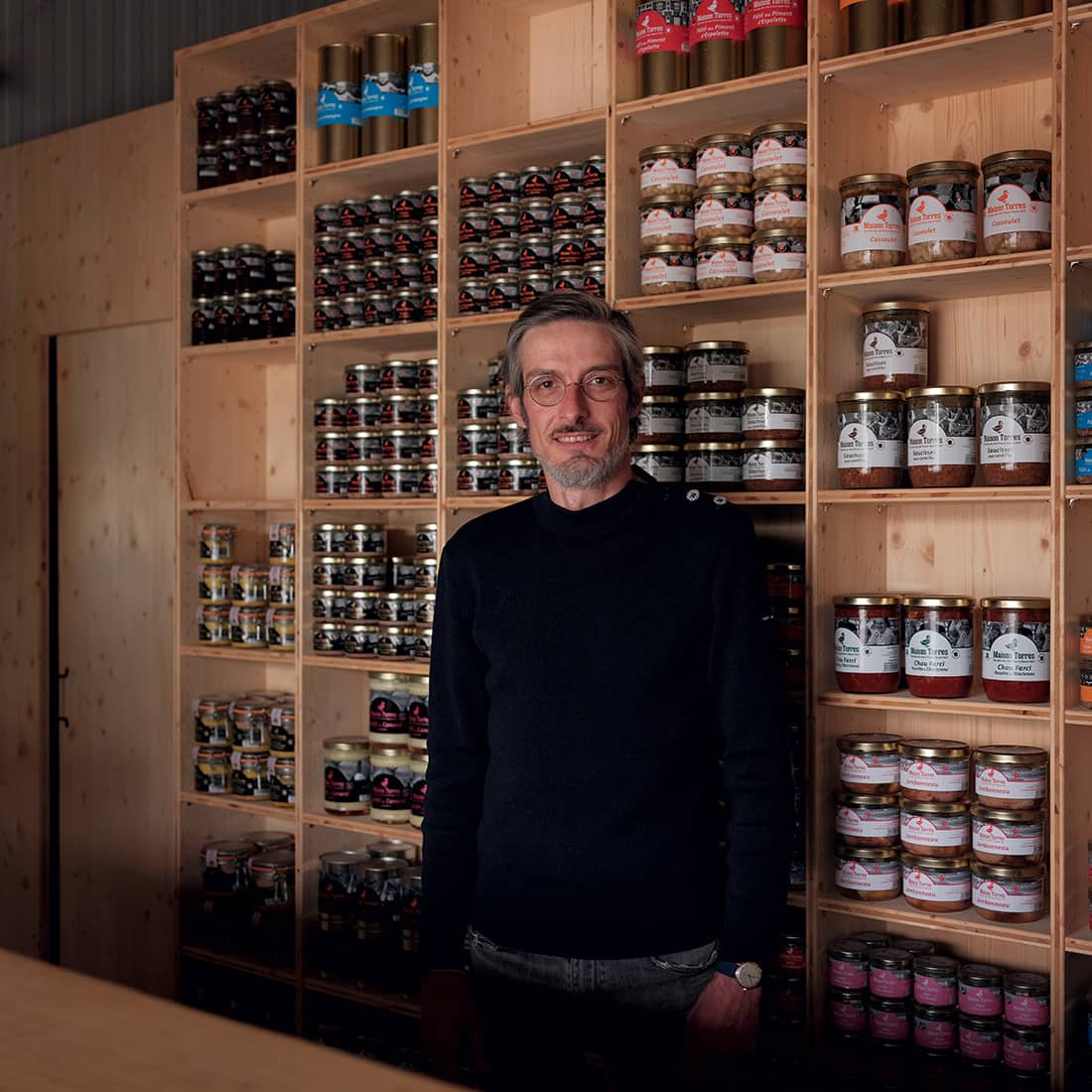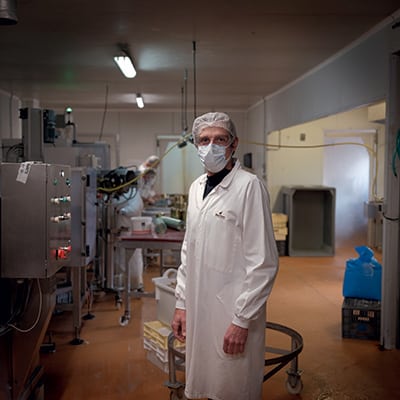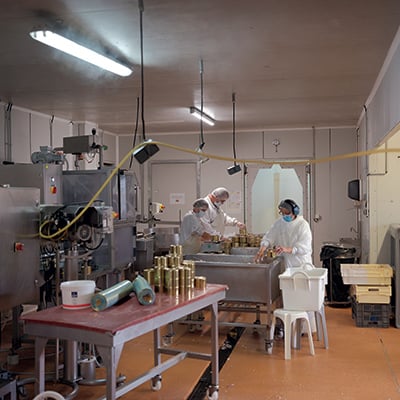The Light at the End of the Tunnel?

The Covid 19 disaster has destabilized all companies, but smaller enterprises, with their operational challenges and lack of adequate finances to cushion the blow, have definitely been hit hardest. For Jordi Raynal (E.17), the pandemic was a serious threat to the very survival of his SME, a traditional canning factory that he has been totally committed to for the past two years. Although the company received support from its banks (just in the nick of time), it still has a hard road ahead.

1999 – Export sales assistant, Legrand 2002 – Sales representative, Géodis 2006 – Head of sales, STEF 2012 – Director, Marketing Performance, STEF 2017 – EMBA HEC diploma 2017 – Acquires the SME Torres & Fils with his associate Denis Bertolino
How was your company doing when the Covid 19 pandemic began?
Jordi Raynal: This should have been a great growth year for Maison Torres, the canning enterprise I acquired with my associate Denis Bertolino in 2017 and in which we have both heavily invested. Things definitely haven’t gone as planned! After 20 years working in big corporations in the Paris area, I took over this family-owned operation located in a little village near Marmande because I wanted to be involved in an entrepreneurial project that had strong local and human roots. Maison Torres is that kind of company. Since 1956 it has been producing preserved meats, pâtés and traditional Southwest France dishes, none with any artificial additives, and it has provided jobs in a region that offers limited employment opportunities. We invested 600,000 euros in modernizing the factory’s production line and going digital (setting up an ERP, CRM tools and a commercial website, www.maison-torres.fr). We also hired new employees and created a new brand to go along with the historic Maison Torres label; the new one, Belle Garonne, features organic products and is geared to specialized distribution channels (Biocoop, La Vie Claire…). The company has 15 salaried workers – 10 in the factory and five involved in sales – and achieved around 2 million euros in turnover in 2019. This year began very well: in early January 2020, all the Franprix stores in the Paris region began to carry our products.
How has the pandemic affected your business?
Jordi Raynal : At first it seemed that the agribusiness sector wouldn’t be hurt too much by the crisis, but then our turnover fell by 50% in March and April. Our major supermarket-chain clients quickly began to focus on getting their deliveries through their platforms, which were mainly served by the big national producers. Maison Torres, the backbone of our enterprise, achieves 75% of its turnover through direct sales to local stores. These stores, forced to reduce their staffs because of the pandemic, no longer met with salespeople to place orders. On top of that, at the beginning of the lockdown consumers started prioritizing basic products (pasta, yoghurt…). Hardly anyone was buying specialty products. Because of all this, most of our sales were to the distribution centers of Auchan, Casino, Carrefour and Franprix and mainly involved our core products, like our meat terrines, that have a four-year shelf life and can be easily stored.
“We have a close-knit team: that helps!”
Jordi Raynal
What were your operations like during the crisis?
Jordi Raynal : Everything slowed down. Our teams worked until April 6 to fulfill our Franprix orders. By the end of the month, though, 80% were on partial unemployment. We took care of daily operations with the equivalent of four full-time positions, compared to 17 normally: our two employees who handle logistics, our supervisor and our accountant, both working half-time, and my associate and myself.
How did your employees react to this?
Jordi Raynal : Very well, because we have a close-knit team. That helps! While many agribusiness companies saw their personnel exercise their right to refuse potentially dangerous work, our employees were always ready to help fill our current orders. Some of these people have been working here for 15 or 20 years and know the company’s history better than we do. They are very motivated do what they can to save the business. I really admire their commitment, especially since many of our partners have had a lot of problems since early March…which has made us realize how much we depend on them! The company that produces our labels had to close down because one of its employees tested positive for the coronavirus, and we only had one month’s worth of labels in stock. Our maintenance technicians couldn’t make visits, and our equipment is like clockwork: if something malfunctions, everything has to be shut down. Finally, our local carrier, which handled deliveries in the Lot-et-Garonne, was in trouble because many of its drivers had decided to exercise their right to refuse to work.
Have you managed to get any particular kind of assistance?
J.D. : We contacted our banks in March to ask for a six-month delay in repaying our loans as well as an overdraft authorization. We also asked for a six-month delay in paying rent to our landlord. URSSAF agreed to postpone our employer contributions and the DIRECCTE (the Regional Directorate for Companies, Competition, Consumption, Work and Employment) gave us the right to lay off our employees until June 30 if necessary, with 84% of their net salaries reimbursed by the government. We are lucky we’re in France. Support for companies was put in place quickly, which isn’t the case in many countries.
How are you managing financially?
Jordi Raynal : We came up with a financial plan based on the situation getting back to normal by June 15. To tell the truth, if our plan had been refused, we wouldn’t have had the finances to keep going. While we were waiting to hear from the banks, we were extremely worried. Denis and I are very close and talked things over a lot; that’s the advantage of having a partner! We imagined every possible scenario, including shutting the company down completely. What was hardest for me was knowing that our project might fail for reasons totally separate from the business. It’s maddening. For me personally, I knew that I could bounce back, though a bit battered. When you acquire a company, you put everything on the table, without a safety net! But I kept thinking of people who had told their stories at HEC, about starting over from zero after a project went bust. In fact, I was more worried about our employees and my family. I moved away from Paris to have a home here in the countryside. It’s the kind of lifestyle I wanted for my 16-month-old daughter. The idea of giving all that up was really hard to take. Luckily, we got good news at the beginning of April: our banks approved a loan of 350,000 euros, guaranteed by the government. Banque Populaire will handle 70% of it and Crédit Agricole the remaining 30%. It’s this kind of situation that makes you realize how crucial it is to be on good terms with your banks! Ever since 2017, we’ve had visits from them twice a year during which we bring them up to date on how much business we’ve been doing overall, specific projects we’ve undertaken, and our medium-term and long-term projections. This has given them confidence in us and I’m sure that worked in our favor. Now we have enough working capital to get us to December.
Have you set new priorities because of the crisis?
Jordi Raynal : Even a few months before the crisis, some new trends were developing in the food sector: strong demand for local products and increasing success for neighborhood stores. Even though the big supermarkets and hypermarkets dominated during the lockdown, recent trends confirm that our strategy of focusing on quality products and shorter supply chains is a sound one. Other than our pork, which comes from Brittany, all our raw materials are produced within 50 km to 100 km of our factory. Our strong local ties confirm our identify as a Southwest France producer, and this has been a plus for us during the crisis. We have been able to continue to run our production line and we have maintained close contacts with our suppliers, distributors, banking partners and employees, which will help us get the business back on track. The crisis has also confirmed the popularity of organic foods, which sold very well during the lockdown. So, we have decided to expand our line of organic products.
The Crisis in Numbers
The pandemic and the economic slowdown during the lockdown have caused enormous damage. According to INSEE, France’s GDP fell by 5.8% during the first trimester of 2020, while sales of manufactured goods (clothing, furniture, etc.) dropped by 42.3%. As for unemployment, it grew by 7.1% in the month of March alone.
What are your predictions for the “post-crisis”?
Jordi Raynal : I think we’ll go through a pretty bumpy transition period of three to 18 months, which will require a great collective effort if we are going to get the economy up and running again. Most of the heads of smaller companies in my area plan to let some employees go. I don’t plan to do that, but we’re going to have to find a way to absorb an additional debt burden of 5,000 euros per month, either by cutting expenses or by boosting our turnover by 20% to 25%. We will get a clearer picture of buying patterns and consumer behavior over the next few months. We will have to be flexible and agile in order to adapt. Over the long term, though, this crisis might have some positive effects. Europe will certainly try to limit its dependence on foreign markets and will restore some sort of economic autonomy. And, on the individual level, people are going to ask themselves what role work plays in their lives. Presenteeism is still really strong in French culture, but the lockdown might change the rules of the game.
Last question. Let’s talk about holidays! How are you going to handle your employees’ summer vacations?
Jordi Raynal : Our employees are going to be able to take vacations. The lockdown was a stressful time, hard to deal with psychologically. Certainly not a break! It’s important to be able to recuperate. I’m encouraging each employee to take two weeks off and to set up rotations so that we can keep our production line operating. The human factor is still essential. It’s what has kept our company on its feet!
Propos recueillis par Marianne Gérard
Published by Marianne Gérard



